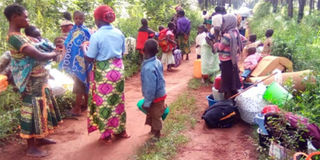Zombo leaders, OPM disagree on relocation

Some of the women and children who fled the war in DR Congo camp at Lendu forest, Zombo District in June. PHOTO/ FELIX WAROM OKELLO
Mr Agustine Ngomber, 46, together with his family of five, arrived through Gulajo border point in Jupamatho Parish, Zeu Sub-county, Zombo District on June 13, frail and hungry.
He is among the estimated 45,000 people, who fled attacks in the eastern DR Congo (DRC), that erupted in May when violent tribal clashes started in War-Palara chiefdom, Ituri.
Mr Ngomber spent nearly 18 days near the closed border point at Zeu Forest while trying to seek asylum in Uganda. Both border points were closed due to the lockdown.
However, the government temporarily reopened the border on July 1 to allow the refugees from eastern DRC (including Alur, Lendu, Hema and the Kebu-speaking groups) but closed again on July 3.
The asylum seekers were received by Mr Hilary Onek, the Minister for Refugees and Disaster Preparedness in the company of Ms Grace Freedom Kwiyucwiny, the State minister for northern Uganda and United Nations High Commissioner for Refugees (UNHCR) officials.
UNHCR in a report stated that between July 1 and 3, about 3,056 people entered Uganda through Gulajo and Mount Zeu crossing points in Zombo District. Sixty-five per cent were children.
Once screened, Mr Ngomber and the group were moved to Zeu Farm Institute, a few kilometres from the border point where they spent the next 14 days of mandatory quarantine.
In the report, UNHCR also said it had coordinated with its partners and OPM and upgraded Zeu Farm Institute to serve as a reception facility near the border in Zombo District, installing 318 family tents, health screening areas, toilets, handwashing facilities as well as nine 10,000-litre water tanks.
The Alur Kingdom offered 5,000 acres of land to settle the refugees after 14 days of quarantine.
Alur Kingdom Prime Minister Vincent Ochaya Orach said: “Among the refugees, a big number belonged to the Alur tribe.”
However, a statement by Minister Onek two weeks ago before Parliament suggesting the relocation of the refugees to Imvepi refugee settlement in Arua District seems to have rubbed Zombo District and cultural leaders the wrong way.
Administrative boycott [G1]
Last week, Alur king Rwoth Ubimu Philip Olarker Rauni III in a statement rejected the proposal by OPM to relocate the refugees from Zombo District to Imvepi refugee settlement camp in Arua District.
He argued that relocating the refugees from Zombo was detrimental to their cultural identities and norms that needed to be safeguarded, adding that majority of the refugees are Alur-speaking community of the DRC.
“History has shown that some refugees who were some years back taken to Bududa and other settlement camps had lost family ties and other cultural identities that have made it hard to trace their origin,” he said.
“We have earmarked up to 5,000 acres of land to resettle the refugees but would be released in bits,” King Rauni added.
Last month, minister Onek told Parliament that his ministry was summarising the relocation plans since Zombo District did not have the facilities and funds to carter for the more than 3000 refugees.
He then directed Zombo District local government to mobilise the refugees for the move that would begin this week.
Although repeated attempts to speak to Minster Onek were futile since he could not answer our telephone calls, Mr James Collins Dombo, the Permanent Secretary at OPM, said the relocation was set to begin immediately although he did not disclose details.
Meanwhile, Zombo District together with UNHCR mapped and embarked on the facelift of some schools and health facilities in Atiak Sub-county such as Atiak Health Centre III, Adiagol PS, Oluku Community School, Gonyubendo P/S in order to be used by the refugees.
Imvepi refugee settlement in Arua District has a land size of 52.9sqkms and a refugee population of more than 90,000.
By February this year, it still needed at least 12,000 people to be filled to capacity, according to data accessed from UNHCR.
Some leaders say
On Monday, Mr John Orwiny, the Zombo District chairperson, in an interview said OPM’s move to relocate the refugees was against an earlier agreement between OPM, UNHCR and the district to allow the refugees settle in the district since the land was available.
“These refugees are part of Alur community in DRC and many of them have relatives here in Zombo. That is why both the district and the Alur kingdom decided to offer abundant land,” Mr Orwiny said.
Last week, State Minister for northern Uganda, Ms Grace Kwiyucwiny, told the media that it was necessary for the UNHCR to use the available resources at their disposal within Zombo District instead of considering relocation.
“This was scary to them because they knew the impact of their relocation on their cultural identity,” she said.
She noted that half of the 3,056 refugees escaped from the reception centre upon hearing that there were plans to relocate them, adding that the remaining refugee numbers were a manageable number for both UNHCR and the district.



